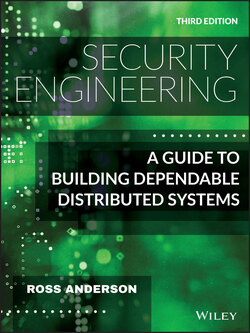Читать книгу Security Engineering - Ross Anderson - Страница 95
3.4.4.1 Naïve choice
ОглавлениеSince the mid-1980s, people have studied what sort of passwords people choose, and found they use spouses' names, single letters, or even just hit carriage return giving an empty string as their password. Cryptanalysis of tapes from a 1980 Unix system showed that of the pioneers, Dennis Ritchie used ‘dmac’ (his middle name was MacAlistair); the later Google chairman Eric Schmidt used ‘wendy!!!’ (his wife's name) and Brian Kernighan used ‘/.,/.,’ [796]. Fred Grampp and Robert Morris's classic 1984 paper on Unix security [806] reports that after software became available which forced passwords to be at least six characters long and have at least one nonletter, they made a file of the 20 most common female names, each followed by a single digit. Of these 200 passwords, at least one was in use on each of several dozen machines they examined. At the time, Unix systems kept encrypted passwords in a file /etc/passwd that all system users could read, so any user could verify a guess of any other user's password. Other studies showed that requiring a non-letter simply changed the most popular password from ‘password’ to ‘password1’ [1675].
In 1990, Daniel Klein gathered 25,000 Unix passwords and found that 21–25% of passwords could be guessed depending on the amount of effort put in [1058]. Dictionary words accounted for 7.4%, common names for 4%, combinations of user and account name 2.7%, and so on down a list of less probable choices such as words from science fiction (0.4%) and sports terms (0.2%). Other password guesses used patterns, such as by taking an account ‘klone’ belonging to the user ‘Daniel V. Klein’ and trying passwords such as klone, klone1, klone123, dvk, dvkdvk, leinad, neilk, DvkkvD, and so on. The following year, Alec Muffett released ‘crack’, software that would try to brute-force Unix passwords using dictionaries and patterns derived from them by a set of mangling rules.
The largest academic study of password choice of which I am aware is by Joe Bonneau, who in 2012 analysed tens of millions of passwords in leaked password files, and also interned at Yahoo where he instrumented the login system to collect live statistics on the choices of 70 million users. He also worked out the best metrics to use for password guessability, both in standalone systems and where attackers use passwords harvested from one system to crack accounts on another [290]. This work informed the design of password strength checkers and other current practices at the big service firms.
